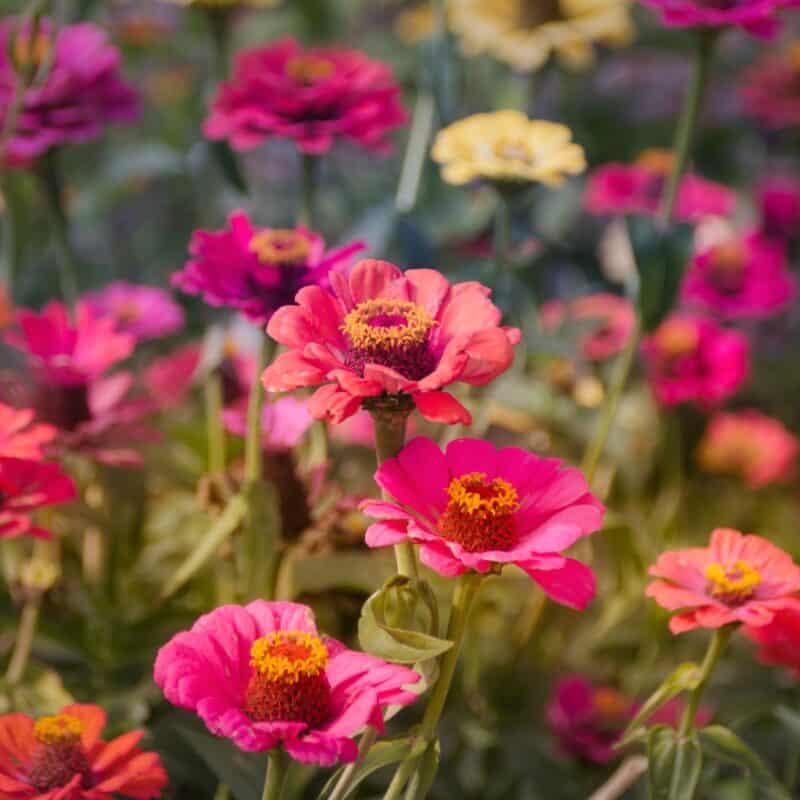Most chicken owners who do any amount of gardening or landscaping around their homes have probably, at one time or another, discovered to their horror that chickens will happily eat ornamental flowers.

They can’t help it, and it’s hard to stay mad at them, but that is cold comfort for all the wasted work.
Knowing what kinds of flowers that chickens can and will eat can help growers protect their plants, and also protect chickens from ingesting anything harmful. How about zinnias? Can chickens eat zinnias?
Yes, chickens can eat zinnias and all parts of the flowering plant are safe, including the petals, stems, and leaves. Zinnias are not particularly nutritious but will give chickens a boost of vitamins and minerals, making them a good choice for a snack when letting chickens forage.
Zinnias are not the most common flower around, but they are popular in many parts of the United States.
Luckily, or perhaps unluckily, chickens can and will eat them with complete safety. Keep reading to learn everything you need to know about giving zinnias to your chickens.
Health Benefits of Zinnias for Chickens
Accurate nutritional profiles of zinnias as food are difficult to come by, but based on other, similar flowers that chickens eat regularly we know they will contain a good cross-section of vitamins, minerals, carbohydrates, and even a little bit of protein.
Together, this can give chickens a good boost of energy and serve as a healthy snack when they are out foraging.
Having a varied diet, including plant matter like zinnias, is good for a chicken’s mental and emotional health.
Can Chickens Eat Zinnias Raw?
Yes, chickens can eat zinnias raw, and in fact, most chickens will prefer to eat them this way.
Raw zinnias will have the most nutrients, so if you have a choice, always go with fresh, live flowers for their snack.
If you are growing zinnias specifically for your chickens then you can let them graze on the plants as they grow. Otherwise, know that they will rip young sprouts right out of the ground.
Can Chickens Eat Zinnia Petals?
Yes. All parts of zinnias are safe for chickens to eat, including the petals. In fact, the petals are probably their preferred part, being quite tender and easy to swallow.
Can Chickens Eat Zinnia Stems?
They sure can. Zinnia stems are not as tasty as the petals, so they may not be the first choice, but they are perfectly safe and nutritious for chickens to eat.
Can Chickens Eat Zinnia Leaves?
Again, yes. All parts of zinnias are safe for chickens to consume. The leaves are a bit tougher than the petals but not as tough as the stems, and chickens will still eat them if they are fresh.
Can Chickens Eat Zinnias Cooked?
Yes, but there is no good reason to cook them for your birds. Cooking zinnias will destroy some of the nutrients, and they are not tough enough to warrant cooking in the first place.
Beware of Pesticides on Wild or Unknown Zinnias
One thing you must be cautious of is the possible presence of pesticides on zinnias, especially if they are wild or you do not know the source.
Birds are particularly vulnerable to pesticide residues because they often feed on insects or eat directly from plants that have been exposed to the chemicals.
Pesticides can be very harmful to chickens and even fatal in some cases. In some cases, pesticide exposure can cause neurological damage, organ failure, and even death.
While the use of pesticides is increasingly ubiquitous as the consumer and industrial level, it’s important to be aware of the potential risks involved.
If you are not sure about the zinnias your chickens are investigating, it is best not to let your flock eat them.
How Often Can Chickens Have Zinnias?
Zinnias, like most other non-feed foods, are a supplemental item or occasional treat for your flock. They should not be the only thing they are eating, nor should they be a daily occurrence.
A good rule of thumb is to offer zinnias to your birds once or twice a week. Zinnias, combined with other supplemental fares, should only make up about 10% of a chicken’s total calorie intake. The vast majority should be made of nutritionally complete chicken feed.
Preparing Zinnias for Your Flock
You won’t need to work very hard to prepare zinnias for serving to your flock. If growing wild or on your property, you can just let your chickens at them and they will do the rest, often eating younger plants right down to the ground.
Alternately, you can harvest zinnias and even give them a quick, rough chop before serving them to your birds.
If you are unsure about the quality or cleanliness of wild zinnias, give them a quick rinse in cool water.
You can also trim off any brown or wilted parts before offering them to your chickens. Other than that, they are ready to serve as-is.
Baby Chicks Have Zinnias, Too?
Yes, but only when they are a bit older and even then in limited quantities. Zinnias are mostly safe for baby chicks, but they should only be given in small amounts as a treat.
Keep in mind that chicks are more vulnerable to choking than adults, and also have a far more delicate constitution.
Too many zinnias can cause digestive upset in young chicks, so it is best to wait until they are around 6 weeks old before offering them any.
Also, it is imperative that chicks get most of their nutrition from starter feed; they are growing quickly and have intense nutritional requirements.
If they fill up on less-than-ideal food they will be missing the nutrition they desperately need.
Tom has lived and worked on farms and homesteads from the Carolinas to Kentucky and beyond. He is passionate about helping people prepare for tough times by embracing lifestyles of self-sufficiency.
